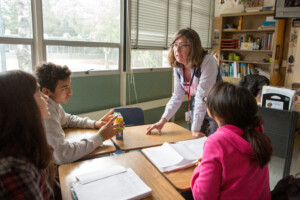A Tale of Three States: The Next Chapter

Last year ExcelinEd, in partnership with Getting Smart, released Policy, Pilots and the Path to Competency-Based Education: A Tale of Three States, where we followed the different paths that Idaho, Florida and Utah are taking to pursue personalized learning. Now, ExcelinEd has released The Next Chapter and we pick up where we left off, tracking the next phase of implementation of each state’s pilot program.
If you have been observing the upsurge in interest and momentum in personalized learning you won’t be surprised to hear that districts and schools in each of these states have made significant implementation progress. Continuing on their own distinct paths, we find each state has the same goal: recommendations for states as they consider a transition to personalized learning.
In our research, one common theme emerged: All three states emphasized an intentional, stepwise implementation. Feedback emphasized the importance of supporting educators with resources and time, as well as connecting schools with others doing similar work through site visits or professional learning networks. School leaders also consistently recommended an incremental approach that includes strategic outreach to parents and communities.
Further, although few state policies are currently preventing implementation, in many cases, schools and districts are finding temporary workarounds, not genuine policy solutions. Workarounds are valuable in the short term, but states must still consider policy change to ease the path for other schools and districts interested in pursuing personalized learning.
Based on the experiences of the pilots in Florida, Idaho and Utah, we offer the following recommendations for states as they consider a transition to personalized learning.
Create Statewide Networks of Innovative Schools and Pilots
Networks help states leverage the expertise of their educators as well as school and district leaders and are a viable strategy for states to advance personalized learning. State departments of education should facilitate convenings for educators participating in pilot programs to collaborate, share ideas and workshop their plans and designs. In addition to providing opportunities for pilot sites to collaborate as a network, states should determine ways to support the specific professional learning needs of individual sites. State grants can provide financial support to conduct site visits, join national networks of practitioners implementing personalized learning and attend conferences and other opportunities for collaborative learning.
Prioritize Communications and Outreach to all Stakeholders
Consistent and effective communication and engagement with students, educators, parents and community stakeholders are crucial for a successful transition to personalized learning. Not only must communication and outreach plans be required, but also an articulated theory of action that underscores the reason for transition and how personalized learning builds on and connects to existing initiatives. From the very beginning, at the time of application, schools must be prepared to articulate their goals, what they hope to accomplish and how they will measure success. In our report, A National Landscape, we offer helpful suggestions of successful messages.
States should support clear communication by collaborating with districts and schools on messaging and developing toolkits to support local communications efforts to ensure that the public hears consistent messages.
Ensure a Continuous Process Is in Place to Address Implementation Obstacles
Schools participating in innovation or pilot programs must have a process to request flexibility from state requirements not only at the time of application but throughout implementation. However, strong support from state departments is needed to help schools maneuver through existing state requirements. Even small technical matters such as inputting data into state reporting systems can pose challenges for schools employing a competency-based education model, requiring time and resources to work around. To ensure that LEAs can successfully implement a competency-based education program, states should proactively engage with LEAs to determine what barriers exist and develop solutions. Not only does this process support implementation for early adopters, but it smooths the path for the future by driving solutions along the way. Networks of innovative schools and pilot programs offer a promising strategy to work through challenging issues at both the state and local level.
These recommendations reflect strategies being implemented and prioritized in varying degrees across all three states. Our research and experience indicates that these policies can make the biggest impact on all three phases of design, implementation and scale regardless of the state context.
ExcelinEd and Getting Smart are proud to support many of these efforts to provide the flexibility and support schools need to truly meet the needs of their students, and we look forward to the progress they will continue to make towards personalized learning.
For more, see:
- Takeaways from the 2017 Blended and Personalized Learning Conference
- Three Schools On Three Paths to Personalized Learning Success
- 30 Leaders on the Successes and Challenges of Project-Based Learning
- A Parent’s Call to Action: Leveraging Personalized Learning for Your Child
Karla Esparza-Phillips is the Policy Director for Personalized Learning at the Foundation for Excellence in Education. Follow her on Twitter: @azkarla
Stay in-the-know with all things EdTech and innovations in learning by signing up to receive the weekly Smart Update. This post includes mentions of a Getting Smart partner. For a full list of partners, affiliate organizations and all other disclosures, please see our Partner page.







0 Comments
Leave a Comment
Your email address will not be published. All fields are required.